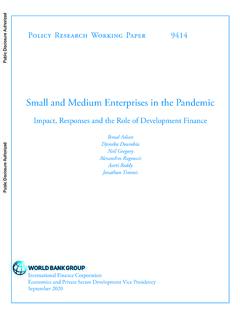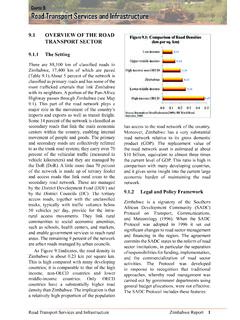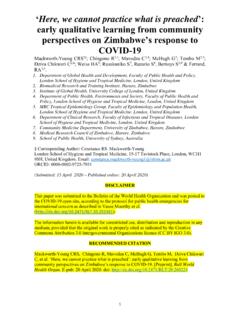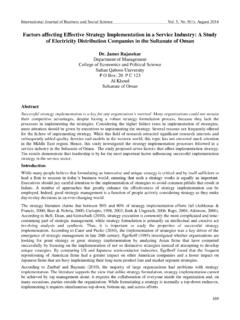Transcription of Impact of Globalization on Social Development
1 United General AssemblyDistr.: General22 March 2000 Original: English00-35468 (E) 280300`````````Preparatory Committee for the special session of theGeneral Assembly entitled World Summit for SocialDevelopment and beyond: achieving Social developmentfor all in a globalizing world Second session3-14 April 2000 Item 2 of the provisional agenda*Preparations for the special session of the General Assembly entitled World Summit for Social Development and beyond: achieving socialdevelopment for all in a globalizing world Impact of Globalization on Social developmentReport of the Secretary-GeneralContentsParagraphsPage I.
2 II. Main features and experiences of 112 III. Trade and 263A. 235B. Patents and intellectual property rights in the Social 266 IV. Information 336 V. Financial markets, capital flows and 457 VI. Macroeconomic policy 5010 VII. Concluding 6410* Preparatory Committee for the specialsession of the General Assembly entitled WorldSummit for Social Development and beyond: achievingsocial Development for all in a globalizing world , atits first session, requested the Secretary-General toreport to it at its second session on the Impact ofglobalization on Social The presentreport has been prepared in response to that request.
3 Ittraces the main features and the experiences ofglobalization for broad categories of countries andsociety, highlights salient features of its Impact onsocial Development as a result of developments intrade, technology and finance, and concludes withsome observations aimed at a closer integration ofeconomic and Social objectives in a global Main features and experiences has closely intertwined economic,political, cultural and institutional dimensions whosesocial Impact is often not easy to the breadth and complexity of theprocess, its principal elements are well advancements, especially in the field ofinformation and communication technologies, have hadthe effect of connecting and bringing the world closertogether in time and space, making possible new waysof doing business and profoundly altering socialinteractions.
4 The proportion of trade in goods andservices relative to national income and consumptionhas expanded, and now includes trade in such servicesas banking, telecommunications and even educationand culture. Domestic deregulation and liberalizationof external capital controls have propelled a vastincrease in the volume and speed of capital flows of alltypes, ranging from foreign direct investment (FDI) toshort-term banking flows, worldwide. Competition hascatalysed a reorganization of production networks, anda wave of mergers and acquisitions have fostered therestructuring of corporations on a global scale, givingthem unprecedented size and power.
5 At the same time,venture capital-financed start ups are burgeoning in high tech sectors in several developed as well assome developing countries. New mass media, such assatellite television and the Internet, have contributed toglobalization and the spread of a culture of these processes are driven by the logicof new technologies or market forces which aredifficult to control, while others may be more amenableto management. Policy decisions oriented towardsliberalization, deregulation and privatization have beenat least as important as market forces and technology inthe spread of Globalization in both its positive andnegative a result of greater access to markets, newtechnologies and new ways of doing business, manyaspects of Globalization have stimulated growth andprosperity and expanded possibilities for millions ofpeople all over the world.
6 At the same time, it has beenaccompanied by anxiety about its disruptive effects anda sense that the opportunities provided by the processof Globalization have not been accessible to many. Ithas enhanced choices for some people but diminishedprospects for others and reinforced inequalities withinand across nations. Perceptions of Globalization dependa great deal on the ability of people to take advantageof the opportunities offered by it. Typically, it is mostpositive for people with adequate education and accessto financial various reasons, the liberalization of tradeand capital flows has been a dominating theme in theeconomic policies pursued by developing countries andcountries with economies in transition during the last10 to 20 years.
7 As a result, nearly all countries at alllevels of Development have taken steps to remove orweaken policy instruments that direct and controlcross-border transactions. They have also given marketmechanisms greater scope internally and reshaped orrestructured institutional frameworks, including labourand financial markets and taxation systems, to enablethe freer play of market actual experience of Globalization has, to agreat degree, varied with the level of Development atwhich a country has engaged with it.
8 Some developingcountries and countries with economies in transitionhave been well positioned to take advantage of the newopportunities for trade and investment, and building ondomestic savings, foreign investment and capitalinflows, technology transfers, human resourcedevelopment and export orientation, have achievedrapid economic , particularly the least developed countries,have not been able to achieve the same levels offoreign investment or access to world markets,primarily due to an inadequate economic and socialinfrastructure.
9 Not only have they been unable to graspthe opportunities offered by Globalization but they havealso had to cope with its impacts, particularly thevolatility of international commodity prices, thereduction of effective preferential treatment for theirexports owing to falling overall tariffs and the declineof official Development assistance (ODA). degree and nature of participation ofdifferent categories of countries in global marketsvaries substantially.
10 For most developing countries,trade in a limited number of goods and servicesconstitute the major form of international economicactivity. For others, private capital inflows supplementtheir foreign exchange earnings, either through FDI orthrough portfolio investment. In only a few developingcountries, mostly in Asia and Latin America, havedomestic companies joined the integrated networks oftransnational corporations and, in some cases, forgedstrategic alliances to exploit dynamic trade andinvestment inter-linkages.










